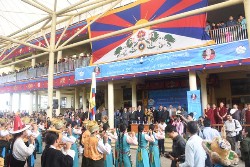Tibetet Segítő Társaság Sambhala Tibet Központ
Tibet Support Association Sambhala Tibet Center
székhely / telephely H-Budapest I. Attila út 123..
(00-36) 70 431 9343 (00-36)70 944 0260 (06-1)782 7721
sambhala@tibet.hu www.tibet.hu tibetpress.info
Facebook/Sambhala Tibet Központ Facebook/Tibett Segítő Társaság
MagnetBank/ 16200010-00110240
IBAN/HU94 16200010 00110240 00000000 SWIFT/HBWEHUHB
(1%) adószám/ 18061347-1-41
nyitva tartás/hétköznap 12.00-20.00 hétvégén előadás függő
» Retro» Tibeti művészet» Interjú» Levelek» Tibet Press» Tibet Press English» Dharma Press» Human Rights» Világ» Kína» Magyar» Ujgur» Belső-Mongólia » KőrösiCsoma» Élettér» Határozatok» Nyilatkozatok» tibeti művészet» lapszemle.hu» thetibetpost.com» eastinfo.hu» rangzen.net» ChoegyalTenzin» tibet.net» phayul.com» DalaiLama.com» vilaghelyzete.blogspot.com» Videók» Linkek» TibetiHírek» Szerkesztőség
Az alulról építkező demokrácia döntő jelentőségű: A tibeti parlament elnöke a demokrácia napján
2019. szeptember 2./Phayul.com/TibetPress
Jelenleg csak angolul olvasható. Magyarul később.
eredeti cikk
By Tenzin Dharpo DHARAMSHALA, Sept. 2: The Speaker of the Tibetan parliament in Exile highlighted the importance of grassroots democracy in the diaspora as Tibetans in Dharamshala, the seat of the exile Tibetan government celebrated the 59th edition of the landmark ‘Mangtso Duechen’, Tibetan for Democracy day here on Monday.
DHARAMSHALA, Sept. 2: The Speaker of the Tibetan parliament in Exile highlighted the importance of grassroots democracy in the diaspora as Tibetans in Dharamshala, the seat of the exile Tibetan government celebrated the 59th edition of the landmark ‘Mangtso Duechen’, Tibetan for Democracy day here on Monday.
“Grassroots democracy is of great importance. This was duly taken note of and as a result village and group leaders upwards in the settlements, including the members of the local Tibetan Freedom Movements and the members of the Local Tibetan Assemblies, have since long been also elected by the local Tibetan people in the exercise of their democratic electoral rights,” Speaker Pema Jungney said at the official function at the Tsuglakhang courtyard today.
Jungney said that to further strengthen and embolden democracy machinery at grassroots level, workshops have been organized for around 25 local Tibetan Assemblies as well as for a group of representatives from independent bodies, apart from other projects in that sphere in the exile Tibetan community.
In the same vein, acting President and member of the Kashag, CTA’s executive branch said that as part of the democratic process, the Kashag and the Tibetan parliament-in-Exile will be convening the Third Special General Meeting of Tibetans in October where they invited public opinion on the “Relationship between the lineage of the Dalai Lamas and the Tibetan people and the Five-Fifty vision.”
The exile Tibetan government known officially as the Central Tibetan Administration holds elections where Tibetan people from 46 Tibetan Settlement Offices, 71 Settlements and Cluster Units in India, Nepal and Bhutan, and Tibetans in the rest of the world directly elect their leadership including the highest office holder of the Tibetan polity, the President, as well as its legislators.
The full fledged Tibetan model was conceived in 2011 as the Tibetan leader His Holiness announced his voluntary devolution of political authority over to a democratically elected head of the polity.
